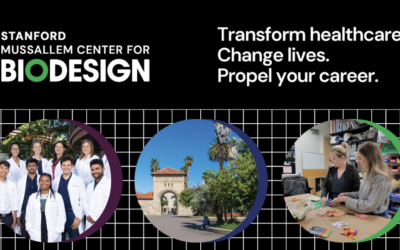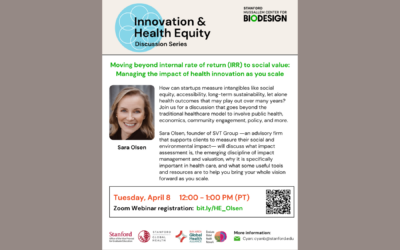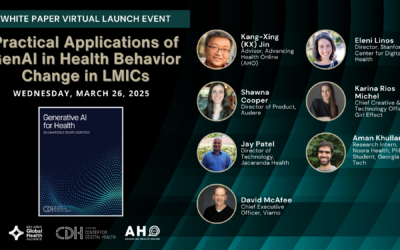On June 2, Stanford Medicine and HAI will host the second annual RAISE Health symposium on responsible AI innovation in health and medicine. This year’s RAISE Health Symposium will highlight real-world breakthroughs in AI — from drug discovery to diagnostics—and confront pressing challenges of trust, safety, and effectiveness.
Search
MEMBERS
- 19Labs
- AbbVie
- Accenture
- Africa Health Business
- AIfluence
- Airbnb
- Americares
- Ananya Health
- Antara International
- Baraka Impact Finance
- Boston Consulting Group
- CCBRT
- Cepheid
- Chevron
- Clinton Global Initiative
- Connective Impact
- Consortium of Universities for Global Health
- Cross-Border Impact Ventures
- Ending Pandemics
- ETR
- Fistula Foundation
- Friends of Chidamoyo
- Friends of the Global Fight
- GAIA Global Health
- Gilead Sciences
- Global Environment & Technology Foundation
- Global Fund for Women
- Global Health Corps
- Global Health Council
- Global Health Technologies Coalition
- Global Impact Advisors
- Global Strategies
- HealthAI
- Hesperian Health Guides
- HOPO Therapeutics
- Ideo.org
- Ipas
- John Snow, Inc.
- Kainomyx
- Kapnek Trust USA
- Kupona Foundation
- L.E.K. Consulting
- LivingGoods
- Mastercard
- Maya Health Alliance
- Medicines360
- MedShare
- Merck
- Meta
- Nivi
- North Carolina Global Health Alliance
- OmniVis
- OPHID
- PATH
- Pathfinder International
- Pendulum
- Pfizer
- Planetary Health Alliance
- Population Services International
- Public Health Institute
- Resonance
- ReSurge International
- Roche Diagnostics
- Sabin Vaccine Institute
- San Francisco Community Health Center
- Seed Global Health
- Simprints
- Stanford University
- — Stanford University Byers Center for Biodesign
- — Stanford University Center for Innovation in Global Health
- — Stanford University School of Medicine
- Street Business School
- Tiba Foundation
- UK Science & Innovation Network
- UNICEF
- University of California
- — UC Berkeley
- — UC Berkeley Center for Emerging and Neglected Diseases
- — UC Berkeley Haas School of Business
- — UC Berkeley School of Public Health
- — UC Davis
- — UC Davis Institute for Pandemic Intelligence
- — UC Global Health Institute
- — UCSF
- — UCSF Institute for Global Health Sciences
- UpSwell
- Viamo
- Vir Biotechnology
- Washington Global Health Alliance
- Watsi
- World Health Organization
- World Telehealth Initiative
- YLabs
- Zenysis
TOPICS
REGIONS
- Africa
- — Cameroon
- — Côte d’Ivoire
- — Ethiopia
- — Guinea
- — Kenya
- — Malawi
- — Mozambique
- — Niger
- — Rwanda
- —— Kigali
- Asia
- — Nepal
- — Pakistan
- — Bangladesh
- — Indonesia
- —— Bali
- — Israel
- Europe
- — Switzerland
- —— Geneva
- South America
- — Brazil
- North America
- — California
- —— Berkeley
- —— Los Angeles
- —— Sacramento
- —— San Francisco
- —— Stanford
- — New York
- —— New York City
- — North Carolina
- —— Durham
- — Washington
- —— Seattle
- — Washington D.C.
Measles Without Borders
Join Stanford CIGH for a Timely Topics in Global Health panel discussion about “Measles without Borders.” A panel of global experts will share their insights on current global trends and challenges with measles.
Using Embedded Implementation Research to Improve Immunization Services and Expand Coverage in Ethiopia
Stanford Read More
A Conversation on Human and Planetary Health with Katharine Hayhoe, Chief Scientist for The Nature Conservancy
Join us at Stanford on May 19 for a conversation with climate scientist Katharine Hayhoe on planetary health, science communication, and climate optimism.
Rethinking Imposter Syndrome
Join WomenLift Health on June 4, 2025, from 10:00 AM–12:00 PM PT (1:00–3:00 PM ET) for a virtual workshop exploring how to recognize and address imposter syndrome in global health leadership.
Applications Open: Stanford Biodesign Innovation Fellowship
Stanford Biodesign Read More
Book Talk: Reimagining Health
On May 22, 2025, join Stanford Center for Innovation in Global Health for an inspiring in-person book talk with the lead authors and contributors of Reimagining Health: Inspiring Stories of Innovators at the Intersection of Health and Technology. This book delves into the stories of health technology innovators, exploring the human side of health technology innovation.
Clearing the Air
Stanford Read More
How Addressing Gender Equality Improves Health for All
Stanford Read More
Imperial Global USA: AI for Healthcare Event
Imperial College London is at the forefront of AI-powered solutions transforming the healthcare landscape, driving innovation in precision medicine, digital health, and biomedical discovery. In conversation with a panel of experts from Stanford and UCSF, they will explore how the science and research ecosystems in London and the Bay Area are shaping the future of healthcare.
The DASON Project: Improving Pediatric Tube-Feeding from Chile to the World
Join Stanford Mussallem Center for Biodesign on Tuesday, May 6 for the next session in its Innovation & Health Equity Discussion Series, “The DASON Project: Improving Pediatric Tube-Feeding from Chile to the World.”
A Vision for a Healthier Nation: New Book Empowers Leaders to Transform America’s Future, Together
Stanford, UC Berkeley Read More
Health Policy Forum: Vaccines and Public Health in An Era of Distrust
Join Stanford Medicine on May 19 for a Health Policy Forum featuring vaccine experts Dr. Grace Lee and Dr. Heidi Larson, discussing the future of vaccines and public health in an era of distrust.
Flu Virus That Can Lead to Paralysis & Brain Swelling Detected in California’s Wastewater
Stanford I UC Berkeley I UCSF Read More
Microbes & Medicine | Research Spotlight: Ami S. Bhatt
Join Stanford CIGH on April 30th for this Global Health Research Spotlight featuring Ami S. Bhatt, MD, PhD, discussing her collaborative, community-engaged research efforts to map the African gut microbiome.
2025 Global Development Research Symposium
The Global Development Research Symposium showcases student creativity, achievement and research from diverse disciplines of study across Stanford University. The symposium will feature the work of scholars, including those who have received funding from the King Center over the last year.
We’re on the Verge of a Universal Allergy Cure
Stanford Read More
Stanford Welcomes Second Cohort to Stanford African Scholars in Global Health Program
Stanford CIGH Read More
Moving Beyond IRR to Social Value
Join Stanford Biodesign for a discussion that goes beyond the traditional healthcare model to involve public health, economics, community engagement, policy, and more. Sara Olsen, founder of SVT Group ― an advisory firm that supports clients to measure their social and environmental impact ― will discuss what impact assessment is, the emerging discipline of impact management and valuation, why it is specifically important in health care, and what some useful tools and resources are to help you bring your whole vision forward as you scale.
The Potential of GenAI for Health Behavior Change | Key Takeaways from the White Paper Virtual Launch
On March 26, the Bay Area Global Health Alliance hosted a virtual launch event for the recently released white paper, Generative AI for Health in Low and Middle-Income Countries, showcasing research conducted by Stanford Center for Digital Health (CDH), with support from Advancing Health Online (AHO). The discussion explored the five key findings from the research: 1) sharing learnings, 2) focusing on actionable measurement, 3) improving language and localization, 4) improving technical capacity and shared infrastructure, and 5) improving digital and basic health infrastructure.




















